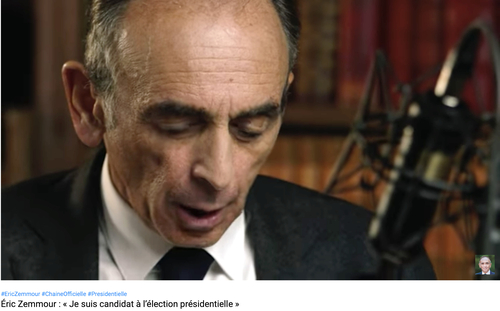What to make of Éric Zemmour, the just-declared candidate for president in France in 2022?
His last name in Arabic means, perhaps suitably for an intellectual, honking, as what geese and car horns do.* His parents fled Algeria and he openly identifies as a Jew but presents himself as the representative of traditional Catholic Deep France and the scourge of immigrants and Islam. He adopts positions on Jewish issues so extreme that France's Chief Rabbi Haim Korsia called him an antisemite. He's been twice found guilty of hate speech and wears these condemnations proudly. His anti-feminist positions are antediluvian. He's pro-Russian and anti-American.
 A screengrab from Éric Zemmour's low-key announcement that he is a candidate for president of France. |
I experienced this last first-hand in Budapest in March 2019, when he and I attended the same conference. Seeing him a couple tables away at the breakfast room, I approached him and introduced myself in a decent French. With the classic Parisian disdain of a café waiter dealing with a boorish foreign customer, he snubbed me, quickly ending the conversation and leaving me slighted.
Despite my many criticisms, large and small, of Zemmour, I would vote for him were I a French citizen. That's because he grasps an essential truth, that France faces a scourge from immigration, that the country needs more babies, and that the elements which made France great are in peril of being overwhelmed by alien cultures. He speaks these realities eloquently and fearlessly, hoping thereby to revive a country that otherwise is heading toward a self-imposed crisis.
Zemmour's chances of reaching the second round of the presidential election are poor and his chance of prevailing in that second round are even smaller. In short, he is highly unlikely to become France's next leader. But he is, in a way unparalleled anywhere else among politicians in Western Europe or North America, raising and articulating civilizationist issues that need to be heard and that must, eventually, be addressed. Therein lies his role and his importance. (December 2, 2021)
* Dec. 2, 2021 addenda: (1) Two readers inform me that the name زمور is actually Berber and means olive tree.
(2) Serge Benche, a French reader tells me that he has been in contact with Zemmour for over 20 years, during which time he sent Zemmour many of my writings. So, he expressed especial disappointment that Zemmour did not treat me "as a peer."
